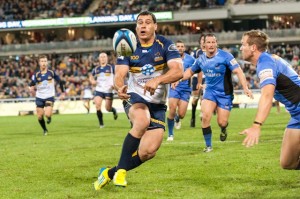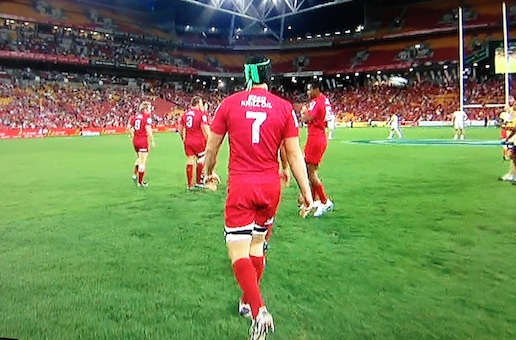
Recently Matt wrote an article on why it was that Liam Gill did not get an ARU top up to his contract. The article caused a lot of good debate & pointed out some flaws in the ARU’s methods. To my mind, it raised one very good point, which is that the ARU have and are going to have continuing trouble with the financial clout of European (especially French) and Japanese clubs. On top of the financial problems Scott broke to the world here, it’s an area the ARU need to pay attention to.
In keeping with the Green & Gold Rugby’s tradition of putting together articles which consider subjects the mainstream tend to ignore, I’m going to stick my neck out and propose some ways ARU might try to defend itself against cashed up European and Japanese clubs.
In my view, Matt was right on the money (pardon the expression) that the ARU is not being especially clever by basically giving players the threat of France or Japan as the only real negotiating card they can play. As there is no immediate prospect of the ARU being able to compete directly with these clubs financially, the ARU needs to reduce or to take this threat away.
The reason the French clubs are able to be such a threat is that their salary cap is a bit over twice the ARU’s (4.8 million vs. 10 million). The Japanese clubs have no salary cap and the corporations that own the clubs pump huge amounts into the teams.
I’m not going to propose an increase to the salary cap to this level – someone would need to pay and that would probably end up in higher ticket prices. But if that’s not an option, what is?
The Luck of the Irish?

I think we should borrow from the Irish. Aside from paying him very well, it wasn’t luck that kept Brian O’Driscoll in Ireland. Other Irish stars such as O’Connell, O’Gara et al have stayed in Ireland, so it can’t just be the €. We need to look deeper.
The reason is subtle and in my opinion, damn clever. When an Irish sportsman retires from playing, provided he (or she) has remained in Ireland they can “claim back tax for any ten years of their active sports career by way of a 40 per cent deduction from gross qualifying receipts (before expenses) directly arising from such sporting activities for each of the years concerned”.
Consider 40% of what the ARU might have paid George Smith over his highest paid 10 years is hundreds of thousands of dollars. Enough to compete against overseas cash? You’d have to think that, the weather and test rugby would be quite an incentive to stick around.
The social benefits of joe public subsidizing a pro-player’s wages in order to keep more talent in Australia need to be debated. That said. I reckon the average Irish fan is pleased B’OD stayed for his whole career. So are the companies who make products for sale at the RDS stadium whose crowds have doubtlessly been higher because of him
Look Inside Australia?
The other way to get creative is to take a lead from the AFL when it comes to salary caps – provide exemptions.
For example: David Pocock plays his entire career in Australia, the ARU have a tax break that makes it not worth his while to head abroad and when he is 34, he gets an exemption from that salary cap as well. So he’s well paid and, in return for the kindness from Joe and Jane Taxpayer, crowds are higher, the team is better and he works with under-privileged kids in Australia and not Ireland.
What not to do.

The ARU has been treading an interesting line as it tries to figure out what to do to get George Smith eligible. I’m as concerned about how Luke Burgess has managed to get himself a place in the squad (or seriously considered) at the expense of Nic White and Nick Phipps. The New Zealanders got a bit burned with Luke McAlister who came back from Sale and was a bit off test standard and never really got back. Ma’a Nonu went to Japan in the 2011 off-season to get some cash and never showed much form for the Blues. Rocky played the season of his career with Leinster and was bunged the rest of time he was back in Australia. George Smith appears the exception.
In other words, the situation now is that the unions are compromising against the threat of losing a player for the entire season by letting them skip rest and preparation. For some players it works but for most it seems not to and I think the benefits to the code of keeping more here for longer would be clear. It’s also the thin edge of a dangerous wedge the ARU has so far not gone too far with but it may not last.
Could it work?
Reckon it could work? Reckon the old school ties in Saint George’s Square have the connections to get something started? Might the ACB get on board to stop players going to the IPL?
There are a truck load of details to work out but the facts remain. The cashed up clubs are going to be a thorn in the side of the ARU for years to come. For established players like Quade Cooper, the ARU seems to be always dragged into a saga every 2 years. On the other end of the top-up scale, young blokes like Liam Gill will be left thinking that they may as well threaten to walk to try get a pay packet that reflects their status or start wanting en-masse to skip pre-seasons to play in Japan.
The current system of contracting players is unbalanced and skews thinking to the short term. It could be improved if there was some thinking out of the box, which needed in Australia’s sporting market. Let’s hear your ideas below.


